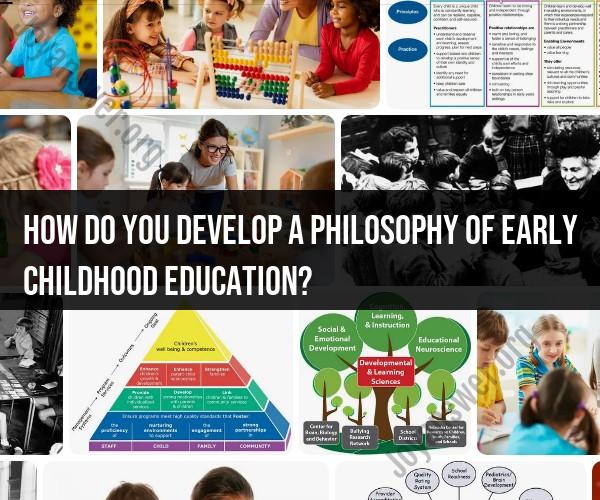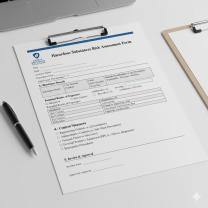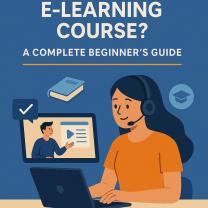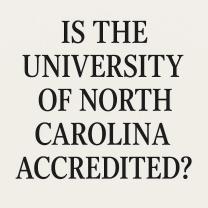How do you develop a philosophy of early childhood education?
Developing a philosophy of early childhood education involves defining your beliefs, values, and principles that guide your approach to teaching and learning with young children. Here's a methodological approach to crafting your philosophy:
Self-Reflection and Values Assessment:
- Reflect on your own beliefs, experiences, and values regarding education, child development, and learning.
- Consider your fundamental beliefs about children, their capabilities, and the role of education in their lives.
- Identify your core values that you want to prioritize in early childhood education (e.g., creativity, social-emotional development, individualized learning).
Study Educational Philosophies:
- Study various educational philosophies such as Montessori, Reggio Emilia, Waldorf, or others to understand their principles, approaches, and ideologies.
- Identify elements from different philosophies that resonate with your beliefs and align with your vision for early childhood education.
Research and Theoretical Framework:
- Explore theories of child development (e.g., Piaget, Vygotsky) and educational theories that inform teaching practices.
- Consider research-based practices, evidence-based interventions, and current trends in early childhood education.
Observation and Experience:
- Observe early childhood settings, classrooms, or programs to gain practical insights into different approaches, interactions, and teaching methods.
- Reflect on your observations and experiences, noting what aspects of those environments you find effective or inspiring.
Define Key Principles and Practices:
- Based on your reflections, research, and observations, define the key principles and practices that will form the foundation of your philosophy.
- Outline your beliefs about child-centered learning, the role of the teacher, the learning environment, curriculum, assessment, and parent involvement.
Write Your Philosophy Statement:
- Articulate your philosophy in a coherent and concise statement that encapsulates your beliefs, values, and approach to early childhood education.
- Organize your thoughts into a structured document outlining your philosophy, including your vision, beliefs, guiding principles, and practices.
Continual Reflection and Refinement:
- Your philosophy is not static; it should evolve with experience, ongoing learning, and new insights.
- Continually reflect on your practices, engage in professional development, and refine your philosophy based on new knowledge and experiences.
By following this methodological approach, you can develop a well-defined philosophy that serves as a guiding framework for your practices and decisions in early childhood education.
What are the fundamental principles of progressive education for young children?
Progressive education offers a distinct approach to early childhood education, emphasizing student-centered learning, active exploration, and the whole child's development. Here are some key principles that guide this philosophy:
1. Child-centered learning:
- Curriculum and activities are tailored to children's interests, needs, and developmental stages.
- Focus on active learning through play, exploration, and investigation.
- Respect for individual learning styles and paces.
- Children's questions and curiosity are central to the learning process.
2. Active exploration and hands-on experiences:
- Learning primarily happens through doing, experimenting, and interacting with the physical world.
- Emphasis on open-ended activities and play-based learning, allowing children to discover and build knowledge independently.
- Outdoor play and connection with nature are valued.
3. Collaboration and social-emotional development:
- Collaboration and peer interaction are encouraged to foster social skills, empathy, and cooperation.
- Focus on building a supportive and respectful classroom community.
- Social-emotional learning is integrated into the curriculum.
4. Project-based learning and real-world connections:
- Learning revolves around meaningful projects that engage children's interest and connect to real-world issues.
- Problem-solving, critical thinking, and communication skills are developed through project work.
- Integration of various disciplines for a holistic learning experience.
5. Whole child development:
- Focus on nurturing not just academic skills but also social, emotional, physical, and creative development.
- Attention to the child's emotional well-being and sense of self.
- Recognition of the importance of play and creative expression in child development.
Remember:
- Progressive education is not a one-size-fits-all approach and can vary in implementation depending on the specific school or program.
- It emphasizes collaboration between teachers, parents, and the community to create a supportive learning environment for young children.
- While it offers a distinct philosophy, its principles can also be combined with other educational approaches in effective ways.
If you're interested in learning more about progressive education for young children, I encourage you to explore specific schools or programs that implement this philosophy and see how it might align with your child's individual needs and your own educational values.











